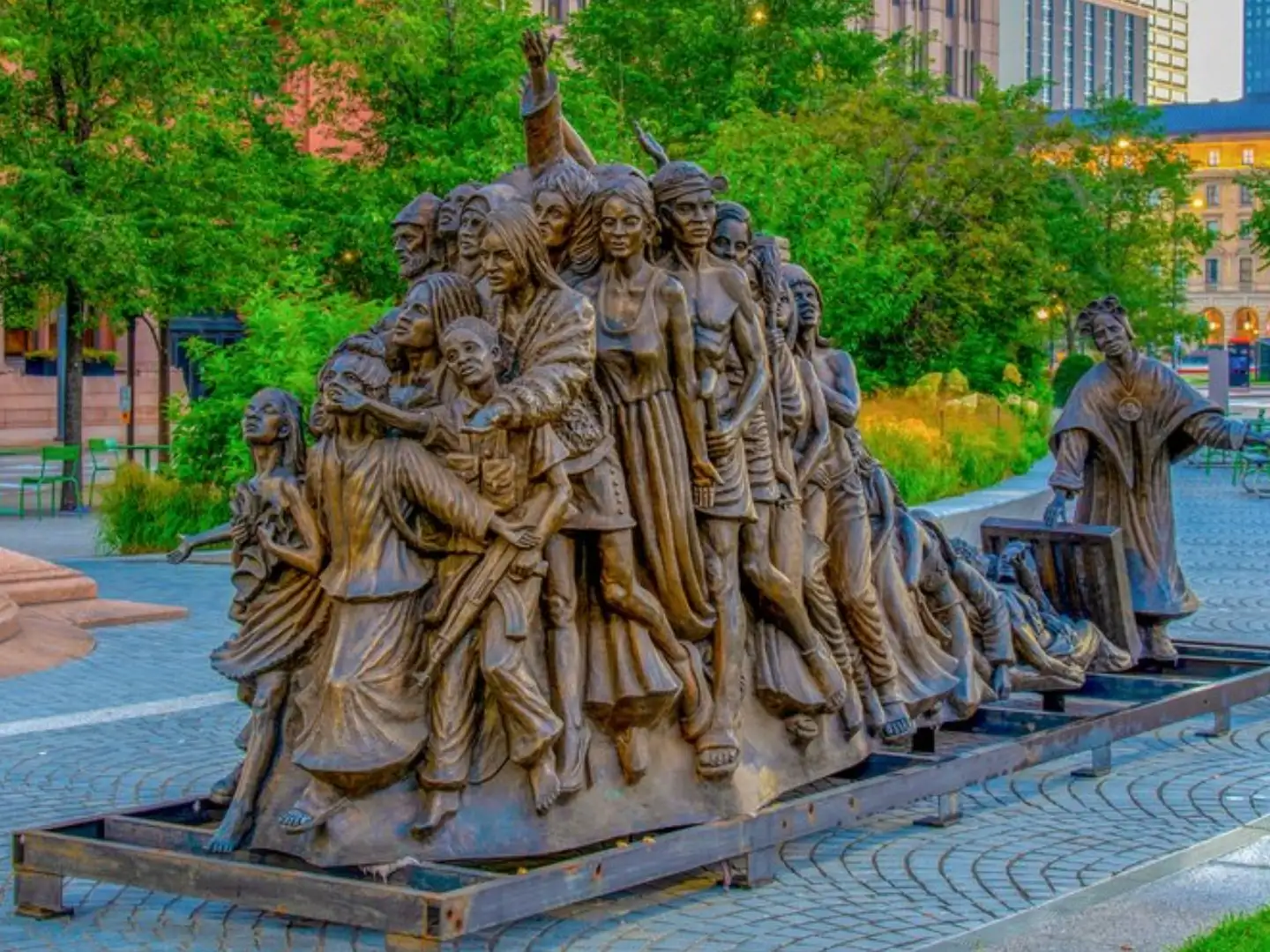Spiritual practices for the Jubilee Year
Would you like to deepen your faith in this Jubilee Year? Register to join our webinars exploring Jubilee themes.
We celebrate God's liberating power in our lives and think about how we can proclaim freedom in this Jubilee Year of Hope.
The image below is of a sculpture called Let the Oppressed Go Free by Timothy Schmalz.
St Josephine Bakhita, herself a survivor of human trafficking, is the person lifting the trap door to release people from their oppression.
Take a moment to consider the image and the thoughts and feelings it evokes.


Let the Oppressed Go Free by Timothy Schultz
Now let's listen to the Timothy Schmalz, the artist, reflecting on this piece.
As we reflect on our theme of proclaiming freedom, we read the words of the prophet Isaiah which inspired the sculpture.
Is not this the fast that I choose:
to loose the bonds of wickedness,
to undo the straps of the yoke,
to let the oppressed go free,
and to break every yoke?
Is it not to share your bread with the hungry
and bring the homeless poor into your house;
when you see the naked, to cover him,
and not to hide yourself from your own flesh?
Then shall your light break forth like the dawn,
and your healing shall spring up speedily;
your righteousness shall go before you;
the glory of the Lord shall be your rear guard.
Isaiah 58: 6-8
A Jubilee as a year of debt cancelation and economic reset has a basis in the Bible. In Deuteronomy, is states that every 7th year, “every creditor shall release what he has lent to his neighbour.” The book of Leviticus counts 7 cycles of 7 years to command a Jubilee year: “you shall consecrate the fiftieth year, and proclaim liberty throughout the land to all its inhabitants.”
What is freedom?
What is envisioned in the Old Testament with the Jubilee year is a year of freedom. What is freedom? We sometimes envisage freedom in negative terms, freedom from constraints, free time, freedom from prisons or captivity. Certainly, this is one aspect of the freedom envisioned in the Bible.
As we discussed at the previous webinar on rest, Jubilee is super-Sabbath and means the release of people from work, particularly from oppressive or indentured labour. Yet more fundamentally it's about freedom to relate differently to God, to neighbours and to the land. Relationships are restored so they are not marked by exploitation or unbalanced dependence and control. This is why the cancellation of the debts is so key. Today, as we proclaim the freedom of the Jubilee, we hear the cries of whole peoples and countries seeking the freedom from debt repayments so they can flourish and rebuild hope.
Although the vision of freedom we find in the Bible is positive, many of the commandments of the Old Testament begin with the pretext, “remember you were slaves in Egypt”. The backdrop of oppression, of a lack of freedom, is what forms the prophetic vision. We must confront this in the Bible, and, the reality of it in our world today.
Let's look at one example of CAFOD's work in this area.
The freedom to flourish is a key aspect of the Jubilee vision. A concrete example of this comes from Honduras, supported by CAFOD partner ERIC and explained in the video below.
What inspires the community behind La Milpa? Spirit of freedom.... The freedom of the stream that flows a few steps away from the galley in which the community shares. The freedom of the rain that, although it responds to millenary cycles, sometimes pours down in its entirety without warning. The freedom of the roots that extend beneath the soil and that sprout with the fruits that are exchanged here. The freedom to choose to care for the Common Home, seen as a living, breathing being that shares its gifts, through concrete actions.
We invite you to commit to working for the liberating justice of God's Kingdom in the words of Mary's Magnificat.
My soul glorifies the Lord,
My spirit rejoices in God my Saviour.
He looks on his servant in her lowliness;
Henceforth all generations will call me blessed.
The Almighty works marvels for me.
Holy his name!
His mercy is from age to age,
on those who fear him.
He puts forth his arm in strength
And scatters the proud hearted.
He casts the mighty from their thrones
And raises the lowly.
He fills the starving with good things,
Sends the rich away empty.
He protects Israel, his servant,
remembering his mercy,
the mercy promised to our fathers,
to Abraham and his sons for ever.
Would you like to deepen your faith in this Jubilee Year? Register to join our webinars exploring Jubilee themes.
Did you miss our webinar on hope as a spiritual practice for the Jubilee Year? Explore the resources here.
Find out more about how to be a pilgrim of hope with us in the Church's holy year.